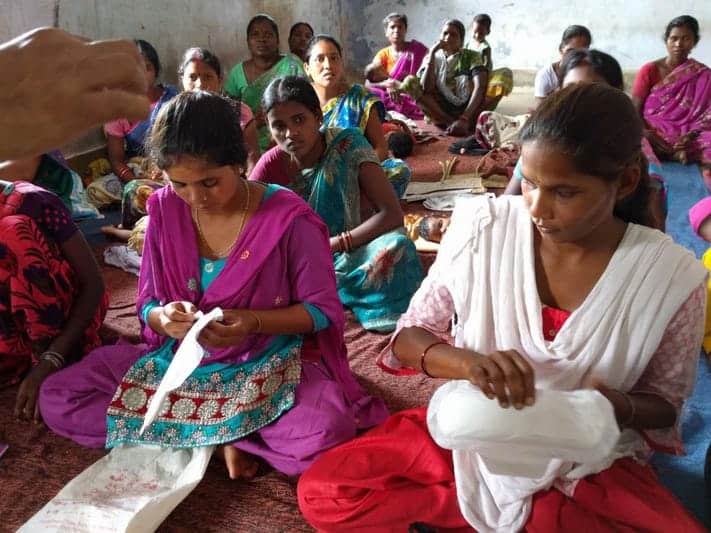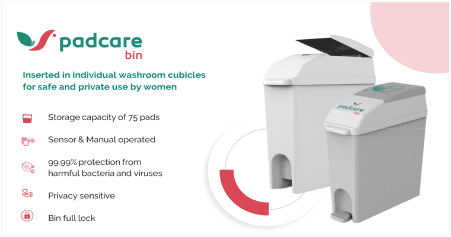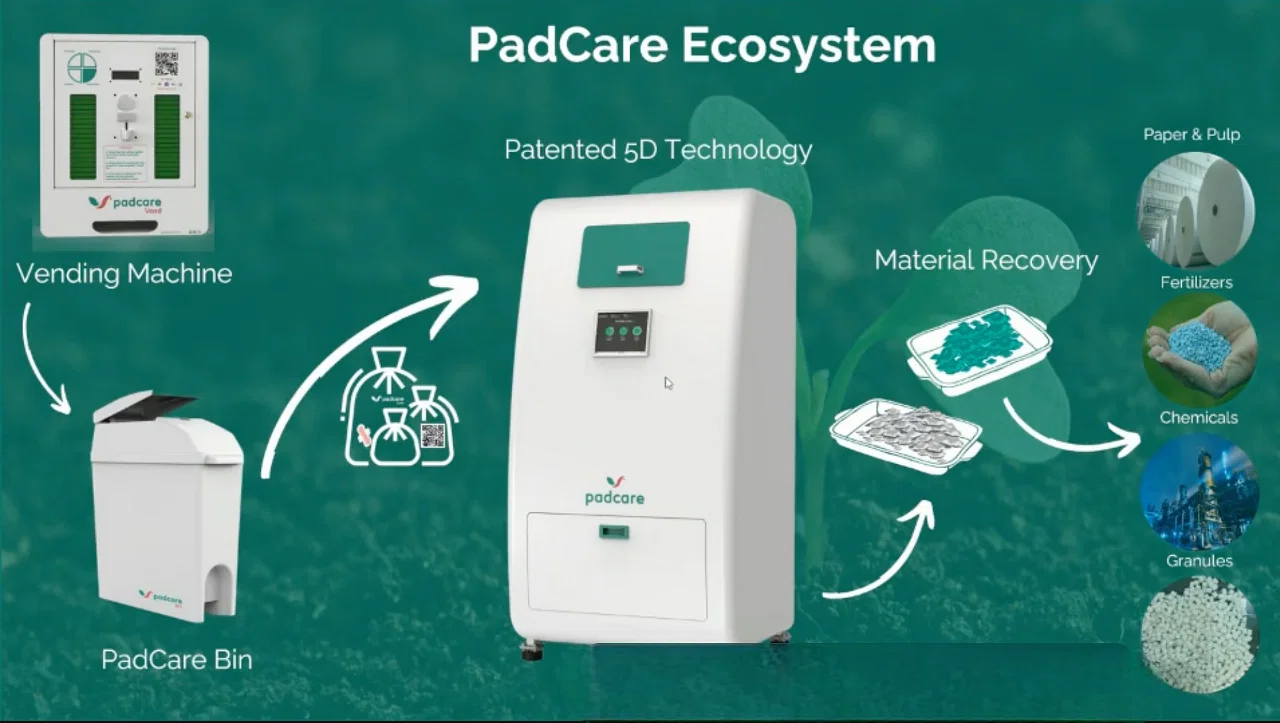Padcare Labs Private Limited
Menstrual management is an underserved space in climate action and health. Thus, PadCare aims to serve as a hygiene management solution that completes the loop of the menstrual hygiene economy by generating harmless, recyclable output out of soiled pads. We seek to bring about positive and significant changes in the sanitary waste disposal system with a broader vision of safeguarding our women, our waste-pickers, the earth. Therefore, our service-based technology addresses issues on the spectrum of sustainable environmental change and menstrual management space.
In developing Padcare we found:
- A lack of awareness among women on the topic of menstruation and environmental issues arising from unregulated menstrual waste disposal.
- Limited access to pads and the knowledge and technology needed to manage sanitary waste, where waste pickers collect sanitary waste from urban localities without protective gears nor insurance despite precarious working conditions.
- With 12 billion pads waste generated each year, it will take 250 to 800 years for these menstrual waste to decompose
- Due to societal norms and prejudice, women manufactured each year are embarrassed to dispose of pads in public toilets and are thus reluctant to change pads in public toilets. As a result, many use the same pad for longer than recommended, increasing the risk of infection
The current incineration technology for sanitary napkin disposal brings disadvantages like high operating costs, high levels of pollution and environmental risks. Thus, PadCare developed a revolutionary 3-S model for menstrual hygiene management to provide sustainability, safety, and solemnity.
Our menstrual hygiene management services counter these issues in two ways. First, we offer sanitary pad dispensers and vending machines to increase access. Second, we install PadCare bins in toilets to collect and manage sanitary wastes. The PadCare Bins are embedded with our patent pending PadCare Vap technology which enables pathogenic lock and is able to store up to 75 pads (1.5 kg) for 30 days. Subsequently, our waste collection and segregation service persons collect menstrual care waste from service stations and recycle it to cellulose and plastic with our patented technology. The cellulose is used for stationery including paper, calendars, packaging materials and more. Padcare Labs also offers menstrual hygiene awareness programmes, sanitary waste footprint calculations and monthly impact certificates.
In the city of Pune, we partnered with the State Bank of India (SBI) to install our Padcare bins in six bank branches. The organisation was receiving complaints of littered washrooms and the smell of used napkins. With no safe disposal solutions, the toilets there were being clogged with pads and the women who used them also felt a lack of privacy as they could not dispose of their pads discreetly.
We installed 40 Padcare bins in the female exclusive public washrooms in these branches. Each washroom serves an estimated 600 women daily and the bins were used frequently for safe and hygienic pad disposal. The bank’s waste collection partner would empty the bins weekly and transport the waste to the central waste processing unit in Pune. Through the use of our patented 5D recycling technology, the pads were converted into reusable cellulose and plastic. The outputs were used as raw material by vendors to make pots for plants.
The staff of SBI also attended a two-day menstrual awareness camp on their premises where we shared information about safe and hygienic menstrual care, the impact of sanitary waste on the ecosystem and current solutions to these issues. Our holistic approach enhanced the infrastructure that manages menstrual health and raised awareness that will target root causes effectively.
By partnering with Padcare, SBI were able to align their waste management strategy with these United Nations sustainable development goals:
SDG 3 Good health and well-being – Better informed menstrual choices and fewer infections among sanitation workers and women
SDG 5 Gender equality – Privacy-sensitive technology enables women to be more in charge of their bodies.
SDG 6 Clean water and sanitation – Availability of a safe, touchless and individual sanitary pad disposal machine
SDG 13 Climate action – Prevents the incineration, burial, flushing or open dumping of sanitary waste.
Padcare has observed substantial ecosystem benefits through its initiatives. Used pads are generally dumped in landfills or burned in the open air. Napkins disposed of unsafely can also infect sanitation workers with E. coli, salmonella, HIV or other pathogens. Incinerating pads results in warming emissions and the release of toxic chemicals including furans and dioxins which are known carcinogens. Our smokeless and odourless sanitary waste management system preempts these emissions.
Additionally, it was reported our engagement with SBI recycled over 250 pads each week. This preempted the release of 71 kilos of carbon and nearly 8 kilos of waste material each week, saving 0.15 cubic metres of scarce landfill space. Our initiatives to safely dispose of, process and recycle sanitary pads thus reduce planetary exposure to health risks.
These services also create better workspaces for women who were initially faced with inconveniences when disposing of menstrual products. This promotes better consideration of women’s needs in the workforce and increases productivity by encouraging participation and reducing absenteeism among women. The enterprise also focuses on awareness sessions among women on sustainable, safe and hygienic menstruation to complement the deployment of padcare services on the premises, such as during the engagement with SBI. This builds the capacity of the community, employers and corporates to adopt more sustainable practices.
Padcare serves over 280 organisations in India including Capgemni, Meta, Procter & Gamble and the Mahindra Group, and with 50 changemakers we are revolutionising the hygiene industry. We are backed by the Government of India and recognised by Forbes, the Royal Academy of Engineering and the American Society of Mechanical Engineers for our technology. With our current clientele, we serve over 500 000 women every month while processing more than 2 million pads and saving 150MT of CO2 equivalent.
We offer services in 8 major Indian cities and our team has been growing exponentially since September last year, expanding our functional bases and diversifying service access to select geographies in India. We have raised substantial funds from venture capital firms as well, proving that social enterprises can leverage the impact investment ecosystem to establish a sustainable business model.



















